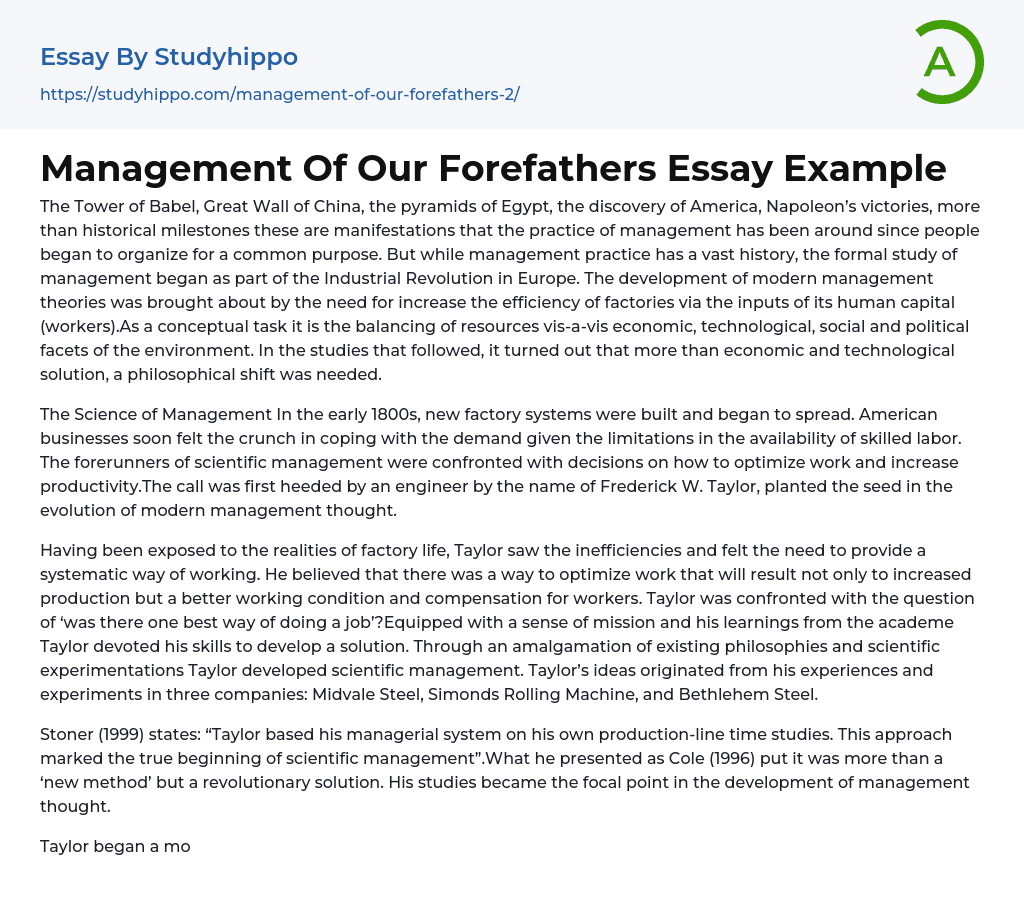The Tower of Babel, Great Wall of China, and the pyramids of Egypt are all examples of historical milestones that demonstrate the existence of management practices since people began organizing for shared goals. However, it was during the Industrial Revolution in Europe that the formal study of management began. The development of modern management theories arose from the necessity to improve factory efficiency through better management of human resources. Management involves balancing resources within the economic, technological, social, and political facets of the environment. Although economic and technological solutions were initially sought, subsequent studies revealed that a philosophical shift was necessary.
During the early 1800s, new factory systems were constructed and became popularized, causing American businesses to struggle with the demand for skilled labor. To combat this issue and maximize productivity, individuals began exploring
...the principles of scientific management. Frederick W. Taylor, an engineer, was one of the pioneers who planted the initial seed in the evolution of modern management thoughts.
Taylor's exposure to the realities of factory life led him to identify inefficiencies and recognize the need for a systematic approach to work. Believing that optimizing work would result in increased production and better working conditions and compensation for workers, he set out to develop a solution to the question of whether there was one best way of doing a job. Drawing on his academic learnings and experiences in companies such as Midvale Steel, Simonds Rolling Machine, and Bethlehem Steel, Taylor developed scientific management through an amalgamation of existing philosophies and scientific experimentation.
In 1999, Stoner asserted that Taylor founded his managerial system on his time studies for production lines, which marked the true beginning of scientifi
management. Cole (1996) considered this approach to be more than a "new method," but rather a revolutionary solution. Taylor's studies were the center of attention in the advancement of management philosophy.
Taylor initiated a movement that enabled people to take charge of their surroundings. Though his scientific studies aligned with the ideals of his era, they facilitated further advancements in management studies. His ideas inspired others to conduct research that built upon his principles and tackled issues related to resource optimization and recognition for achievements. However, the pioneers of scientific management did not foresee the issue of organizations manipulating theories for their own benefit, disregarding the welfare of workers.
According to Mejia, Balkin, and Cardy (2005), Taylor, who had a utopian view of his teachings, did not anticipate their potential for misuse. However, Stoner (1999) recognizes that even though there have been negative consequences, the beneficial impact of scientific management can still be observed today through contemporary assembly lines in factories and applied to various non-industrial establishments, such as fast-food services and surgical training.
- Age Of Enlightenment essays
- Ethos essays
- Time essays
- Acceptance essays
- Meaning Of Life essays
- Reality essays
- Natural Law essays
- Political Philosophy essays
- Utilitarianism essays
- Existence essays
- Free Will essays
- Good And Evil essays
- Confucianism essays
- Relativism essays
- Conscience essays
- Environmentalism essays
- Empiricism essays
- Epistemology essays
- Ethics essays
- Existentialism essays
- Human Nature essays
- Individualism essays
- Metaphysics essays
- Philosophy Of Life essays
- Transcendentalism essays
- Truth essays
- Destiny essays
- Determinism essays
- Fate essays
- Functionalism essays
- Philosophers essays
- Pragmatism essays
- Future essays
- Child Observation essays
- Critical Reflection essays
- Teaching Philosophy essays
- Personal Philosophy essays
- Action Speak Louder Than Words essays
- Can Money Buy Happiness essays
- Values of Life essays
- Ethical dilemma essays
- Normative Ethics essays
- Virtue Ethics essays
- Belief essays
- Deontology essays
- Moral essays
- Virtue essays
- Work Ethic essays
- Henry David Thoreau essays
- Carl Jung essays




